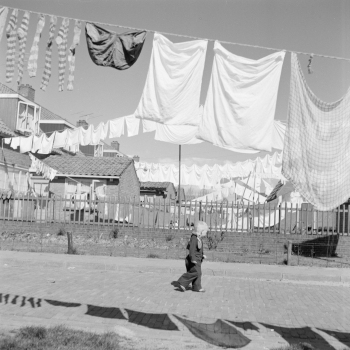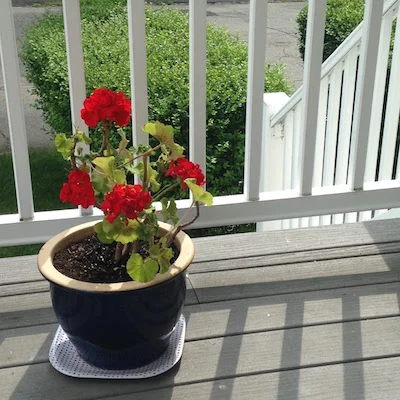Home is where you do your laundry.
I have yet to see this phrase on any of those distressed wooden boards painted with cheery slogans, so ubiquitous in shabby-chic home décor shops. In my homeland of Texas, the signs often say “Home is where you hang your hat,” adorned with a cowboy hat (or boots). I love the variation I saw on a pillow last year: “sweet home sweet,” a four-year-old’s variation on “home sweet home.” And for the last few years, my husband and I have quoted the line from folk band Edward Sharpe and the Magnetic Zeroes: “Home is wherever I’m with you.” We often feel like foreigners in our suburb south of Boston, but we have chosen, and keep choosing, to make a home together, wherever we are.
There are no signs on my walls about laundry, or washing dishes, or my other daily and weekly chores. But after nearly a decade of washing and spinning and hanging clothes to dry, in half a dozen houses on both sides of the Atlantic, I’ve come to believe that laundry is a quiet but essential part of the way I make a home.
I first learned to do laundry in preparation for summer camp, a two-week stay that meant I’d need to wash my clothes in the middle. My mom took me through the process at home, then sent me off with a bottle of detergent, a box of dryer sheets, and detailed instructions in my suitcase. I did fine, neither shrinking nor bleaching any of my shorts, T-shirts, and tank tops. But this was an anomaly: when I came home, I gladly shifted the responsibility of laundry back to Mom.
 Photo: Nationaal Archief via FlickrLike many other college freshmen, I did my laundry in the dorm, tossing it into an industrial-sized washing machine and popping in to check on it every half hour. Washing my clothes and sheets was necessary, of course, but lugging my hamper down three flights of stairs to a room littered with castoff clothes and stray dryer sheets, under buzzing fluorescent lights, did little to help me feel more at home on campus.
Photo: Nationaal Archief via FlickrLike many other college freshmen, I did my laundry in the dorm, tossing it into an industrial-sized washing machine and popping in to check on it every half hour. Washing my clothes and sheets was necessary, of course, but lugging my hamper down three flights of stairs to a room littered with castoff clothes and stray dryer sheets, under buzzing fluorescent lights, did little to help me feel more at home on campus.
My real introduction to laundry’s peculiar power came a year later, when I found myself in Oxford, England, sharing a room in a creaky Victorian house with my friend Joy and a semester abroad with thirty-odd other students from my college. I lugged my two suitcases full of clothes and books up the steep stairs, still bleary-eyed from the flight, humming like a wire. My West Texas eyes could hardly believe the patches of vivid green outside the windows — in January! What place on earth was so green in January? And our room boasted its own tiny balcony, as well as bunk beds, a mantel over a bricked-up fireplace for our books, and two tall wardrobes for our jeans and sweaters.
At orientation, our house parents explained about the laundry. We were responsible for changing our sheets and pillowcases, but the college’s cleaning staff would wash them and provide fresh ones each week, when they came to vacuum our hallways and mop our kitchens. But we did have to wash our clothes. We all started saving the odd, seven-sided 20-pence pieces to operate the machines in the college laundry, located across a muddy courtyard and down a flight of stairs. Glamorous it was not, especially if it happened to be raining on the day you ran out of clean underwear.
I traveled frequently that semester, spending weekends in London to tour museums and see West End musicals, taking longer trips to Edinburgh, Salzburg, Rome. I spent more time in Oxford than some of my classmates did, but I still found myself setting off somewhere new every two or three weeks. After these trips, inevitably, laundry sessions were required.
Washing my clothes became an odd sort of anchor, a muted but vital part of the rhythm of life in Oxford. Pack, travel, come home, do laundry; go to class, do homework, plan the next trip; do laundry, pack, travel again, come home. Home. As I packed and repacked my bulky backpack, boarding buses and trains and no-frills budget airplanes, I began to think of Oxford as home: my gateway to the UK and the rest of Europe, the comforting center to which I returned.
I only took one trip long enough to require its own laundry day: a ten-day trip around Spain with four fellow students. We scrubbed T-shirts and underwear and socks in the bathtub of a stucco pensión in Salobreña, a tiny village on the Mediterranean coast. We pinned them on clotheslines strung between posts on the pensión’s flat roof, taking deep breaths of quiet, citrus-scented village air (we had hiked past groves of orange and lemon trees the day before). Our clothes were mostly dry, and certainly cleaner, when we took them down to repack them, but we still felt grubby and mussed when we finally returned to Oxford. I let out a deep exhale when we stepped off the bus onto familiar cobblestones, the dark sky twinkling with stars above us. The next day, I slung my purple laundry bag over my shoulder and headed across the courtyard to wash my travel clothes.
Nearly eight years and half a dozen homes later, I’m lucky to have laundry right in my house. Most of my Boston-area friends have to save their quarters, waiting until they have several hours free to lug their overflowing hampers to the nearest Laundromat. They still get their clothes clean, of course, but my setup is simpler: I can toss in a load of clothes or towels when I get home from work, then schlep it downstairs to the basement to tumble dry, instead of having to leave home and sit with a book as the machines roar.
Home is where we care for ourselves and others, where we come at the end of the day to lay down our physical and emotional loads. Home is where we decamp to rest and refuel, to eat and sleep and ready ourselves to face the world again. In this way, laundry becomes both nourishment and preparation for battle. Nomadic cultures, immigrants and — yes — college students must do their laundry on the move, but for most of us who hope to live more rooted lives, laundry is something we only do at home. We pack our suitcases for trips, rolling and folding and tucking the clothes in neatly, but we don’t do laundry on the go except in emergencies: we stuff them back in at the end of the trip, waiting to wash away the travel grime when we get home.
Sorting the clothes on the floor of our bedroom, piling them into the hamper, measuring out the detergent and tossing the pieces one by one into our washing machine: this is how I know I’m home. The jerks and thumps of the washing machine, the pause just before the spin cycle, even the obnoxious beep of the dryer: these noises sound like home to me. Doing laundry means I am back in the place where my soul rests, the place where I can marshal my forces, and also lie down and sleep in peace.
Home is where I do my laundry. Maybe the phrase will catch on one of these days.
Katie Noah Gibson is a writer, editor, knitter, and compulsive tea-drinker based in Boston. Born in Texas, she’s a lifelong Anglophile but loves to travel just about anywhere. She blogs at Cakes, Tea and Dreams and tweets regularly.















